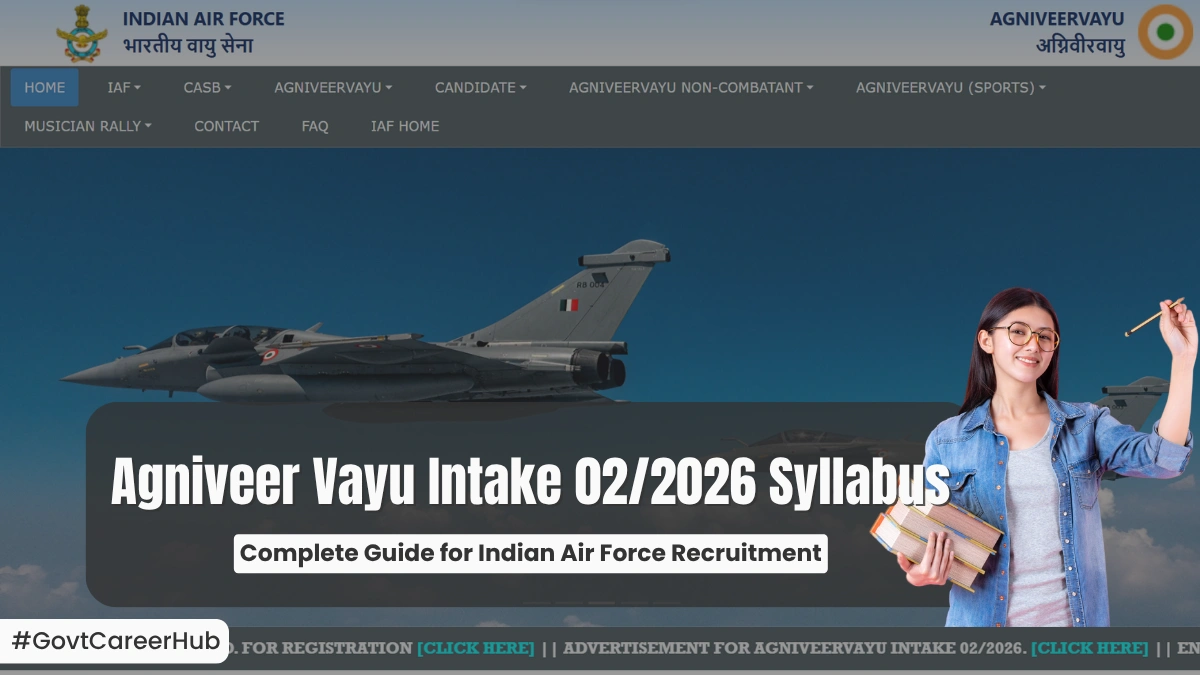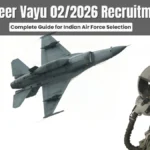Last Updated: July 8, 2025 at 11:36 am
Hello aspirants! We’re excited to share this comprehensive guide on the Agniveer Vayu Intake 02/2026 syllabus. At GovtCareerHub.com, we understand the importance of having accurate, detailed information for your preparation journey.
What Makes Agniveer Vayu Intake 02/2026 Special?
The Indian Air Force has once again opened its doors for young patriots through the Agniveer Vayu scheme. From analysing defence recruitment patterns, this intake represents one of the most sought-after opportunities for joining the prestigious Indian Air Force. The selection process has been designed to identify candidates with both academic excellence and the right attitude for military service.
Complete Syllabus Breakdown – Based on Official Sources
Based on research and interactions with successful candidates, here’s the detailed syllabus breakdown to help you prepare effectively.
For Science Stream Candidates (Duration: 60 minutes)
The examination covers three core subjects from your 10+2 CBSE curriculum. Let me break down each section based on the official syllabus:
Mathematics – Your Gateway to Success
In defence exam preparation, Mathematics often becomes the deciding factor. The syllabus includes:
Fundamental Topics:
- Algebra: Linear equations, quadratic equations, polynomials, and algebraic expressions
- Arithmetic: Number systems, percentages, profit & loss, time & speed, and averages
- Geometry: Properties of triangles, circles, coordinate geometry, and area calculations
- Trigonometry: Basic ratios, heights & distances, and trigonometric identities
- Mensuration: Volume and surface area of various shapes
- Statistics: Data interpretation, measures of central tendency
Important Tip: Focus heavily on speed and accuracy. Most successful candidates can solve arithmetic problems within 30-45 seconds.
Physics – Understanding the Natural World
The Physics section tests your grasp of fundamental scientific principles. Key areas include:
Core Topics:
- Mechanics: Newton’s laws, work-energy theorem, rotational motion
- Heat & Thermodynamics: Temperature, heat transfer, thermal expansion
- Optics: Reflection, refraction, lenses, and optical instruments
- Electricity: Current electricity, resistance, electrical power
- Magnetism: Magnetic effects of current, electromagnetic induction
- Modern Physics: Atomic structure, radioactivity, semiconductor devices
Key Observation: Candidates who focus on concept clarity rather than formula memorisation perform significantly better.
English Language – Communication Skills
The English section evaluates your language proficiency through:
Essential Areas:
- Grammar: Tenses, voice conversion, direct-indirect speech
- Vocabulary: Synonyms, antonyms, one-word substitutions
- Comprehension: Passage-based questions testing understanding
- Error Detection: Identifying grammatical mistakes
- Sentence Improvement: Enhancing sentence structure
For Non-Science Stream Candidates (Duration: 45 minutes)
Based on feedback from non-science background candidates, this pattern is quite manageable with proper preparation.
Reasoning and General Awareness (RAGA)
Reasoning Section:
- Verbal Reasoning: Analogies, classifications, coding-decoding
- Non-Verbal Reasoning: Pattern completion, figure series
- Logical Reasoning: Syllogisms, blood relations, direction sense
- Analytical Reasoning: Seating arrangements, puzzles
General Awareness Topics:
- Current Affairs: Last 6-12 months’ significant events
- Indian History: Freedom struggle, ancient civilisations
- Geography: Indian states, rivers, mountains, climate
- Polity: Constitution, fundamental rights, governance
- Sports: Recent tournaments, awards, achievements
- Science & Technology: Space missions, defence technology
Exam Pattern Analysis – What I’ve Observed
Through analysis of exam patterns, here’s what can be observed about the exam structure:
Science Stream Structure
- Total Duration: 60 minutes
- Question Distribution: Roughly equal weightage to all three subjects
- Question Type: Multiple Choice Questions with four options
- Difficulty Level: Moderate to challenging
Non-Science Stream Structure
- Total Duration: 45 minutes
- Subject Balance: Equal emphasis on reasoning and general awareness
- Question Style: Direct questions with logical reasoning elements
Selection Process – The Complete Journey
Based on interactions with selected candidates, here’s the detailed selection process:
Phase 1: Online Written Test
This computer-based test is your first hurdle. The questions are designed to test both knowledge and analytical skills.
Phase 2: Physical and Adaptability Tests
- Physical Fitness Test: Basic fitness parameters
- Adaptability Test-I: Written test on service-related topics
- Adaptability Test-II: Group tasks and individual assessments
Phase 3: Medical Examination
Comprehensive medical check-up ensuring candidates meet IAF health standards.
Proven Preparation Strategy
After guiding numerous successful candidates, here’s the recommended approach:
1. Create a Realistic Study Schedule
Based on successful candidates’ experiences, allocate:
- 40% time to your strongest subject
- 35% time to moderate subjects
- 25% time to challenging areas
2. Focus on Conceptual Learning
Rather than rote learning, understanding the ‘why’ behind every concept helps candidates perform better in the exam.
3. Regular Mock Test Practice
Take at least 3-4 mock tests weekly during the final month. This builds speed and confidence.
4. Current Affairs Preparation
Dedicate 30 minutes daily to current affairs, focusing on defence-related developments.
Important Preparation Tips Based on Expert Analysis
Time Management Mastery
During practice sessions, aim to complete:
- Mathematics: 45-60 seconds per question
- Physics: 60-90 seconds per question
- English: 30-45 seconds per question
Revision Strategy
Follow the 3-2-1 rule:
- 3 weeks before exam: Complete syllabus revision
- 2 weeks before exam: Focus on weak areas
- 1 week before exam: Light revision and mock tests
Common Mistakes to Avoid
Based on analysis of unsuccessful attempts:
- Spending too much time on difficult questions
- Neglecting English section preparation
- Inadequate current affairs preparation
- Skipping mock test analysis
Eligibility Criteria – Are You Eligible?
Age Limit: Born between 2nd July 2005 and 2nd January 2009
Educational Qualifications:
- Science Stream: 10+2 with Physics, Mathematics, and English
- Non-Science Stream: 10+2 with any subjects including English
Physical Standards: Must meet prescribed medical and physical standards
Key Dates and Application Process
Based on previous patterns, here’s what you need to know:
Important Dates Calendar
Here are the confirmed dates for Agniveer Vayu Intake 02/2026:
- Registration Opens: July 11, 2025 (11:00 AM)
- Registration Closes: July 31, 2025 (11:00 PM)
- Online Examination: From September 25, 2025
- Provisional Select List: May 15, 2026
- Final Enrolment List: June 1, 2026
Important Note: Keep checking the official portal for any updates or changes to these dates.
Read Now: Agniveer Vayu 02/2026 Registration: Complete Guide to Join Indian Air Force
Application Steps
- Visit the official website
- Register with valid email and mobile number
- Fill application form carefully
- Upload required documents
- Submit application and save confirmation
Career Prospects – What Awaits You
Based on interactions with serving Agniveers, here are the benefits:
Service Benefits
- Initial Term: 4 years with potential for permanent absorption
- Training: World-class technical and leadership training
- Compensation: Competitive salary and allowances
- Career Growth: Opportunities in various technical streams
Post-Service Opportunities
- Higher Education: Preference in technical courses
- Corporate Sector: Enhanced employability
- Entrepreneurship: Skills for starting own ventures
Frequently Asked Questions (FAQs)
Ready to Start Your Journey?
The Agniveer Vayu Intake 02/2026 represents more than just an exam—it’s your gateway to serving the nation through the Indian Air Force. With proper preparation, dedication, and the right guidance, you can turn this opportunity into reality.
Remember, success in defence exams isn’t just about intelligence; it’s about consistency, proper strategy, and unwavering determination. Every successful candidate I’ve mentored had one thing in common—they never gave up, even when the preparation got challenging.
Take Action Today!
Ready to begin your Agniveer Vayu preparation? Don’t wait for tomorrow—start today!
🚀 Get Started with GovtCareerHub.com:
- Sample Paper
- Study Materials: Download comprehensive study guides and previous year papers
- Expert Guidance: Join our mentorship programme for personalised preparation tips
- Daily Updates: Stay informed with the latest defence recruitment notifications
📞 Need Personal Guidance? Connect with our expert counsellors who have helped thousands of candidates achieve their defence career dreams. Book your free consultation session today!
🎯 Subscribe to Our Newsletter Get weekly preparation tips, current affairs updates, and exclusive exam insights directly in your inbox. Join our community of 50,000+ defence aspirants!
👥 Join Our Community Connect with fellow Agniveer Vayu aspirants, share preparation strategies, and get your doubts cleared by our expert team and successful candidates.
Your dream of serving the nation through the Indian Air Force is just one click away. Let GovtCareerHub.com be your trusted partner in this journey!
Disclaimer: This article is based on available information and our analysis of defence recruitment patterns. Candidates are advised to refer to official notifications for the most current and accurate information regarding Agniveer Vayu Intake 02/2026.
These articles might be helpful:
- Indian Army Havildar Education Syllabus 2025: Complete Exam Pattern & Guide
- Top 7 AI Tools Transforming Govt Job Preparation in India
- Which Govt Exam is Easy to Crack? Your Complete Guide to Landing a Government Job
- Defence Jobs After Graduation: Your Gateway to Serving the Nation in 2025
- Top Government Jobs Without Exams in 2025 – Merit Based List





